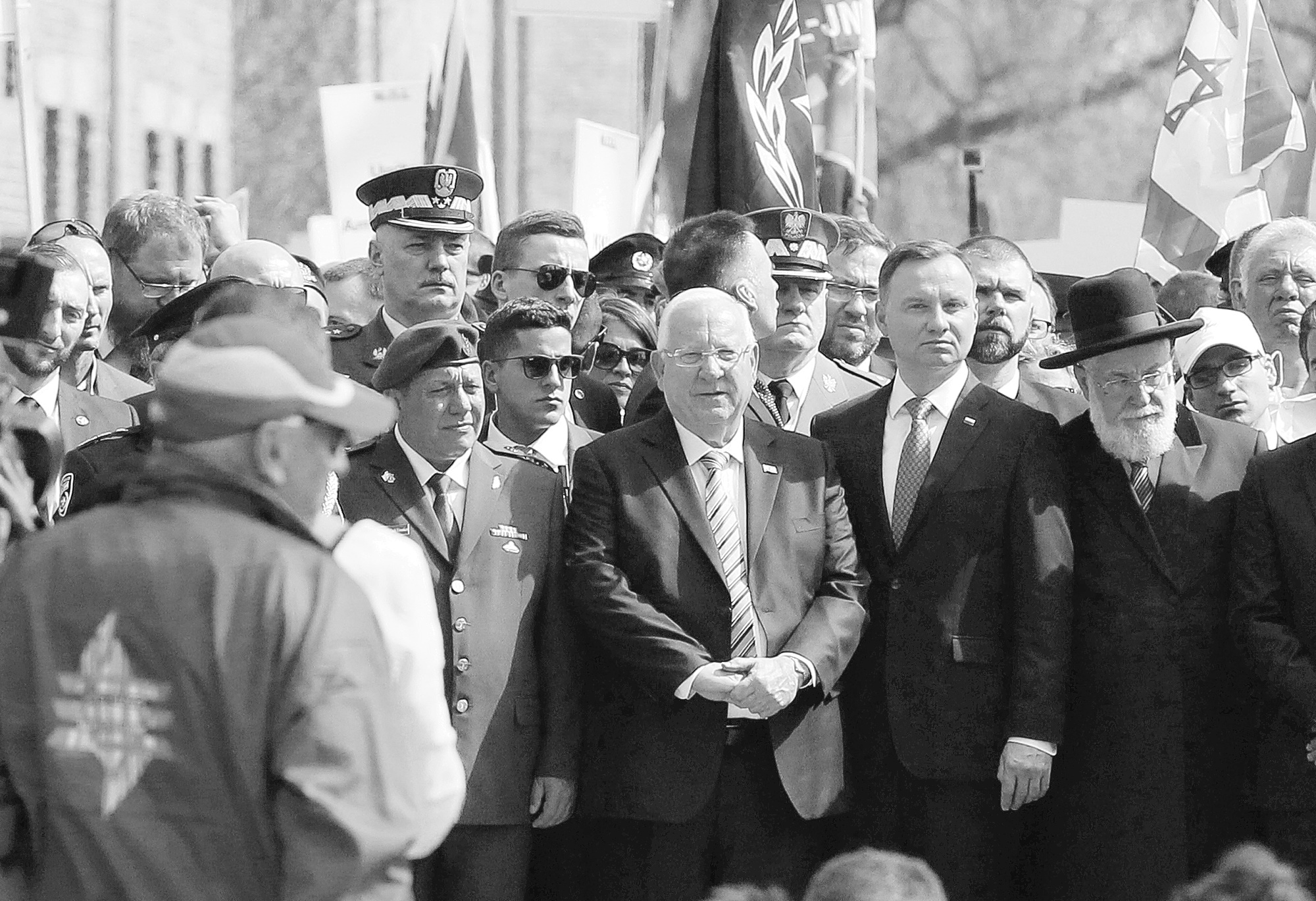
By VANESSA GERA
Associated Press
WARSAW, Poland (AP) — The presidents of Israel and Poland joined thousands of others Thursday for a Holocaust remembrance event at the former Nazi death camps of Auschwitz and Birkenau, hoping to put recent tensions behind them. Presidents Reuven Rivlin of Israel and Andrzej Duda of Poland lit candles, bowed their heads and pressed their hands on the Death Wall, a site at Auschwitz where inmates, chiefly Polish resistance fighters, were executed by Nazi German forces during World War II.
They then led thousands, including many young Jews from around the world, in the March of the Living, which takes place each year on Israel’s Holocaust Remembrance Day. The solemn march began at the main gate of Auschwitz and ended 3 kilometers (2 miles) away at Birkenau, where Jews from across Europe were transported by train and murdered in gas chambers. Duda said he and Rivlin were there to give testimony to the destruction of the Jewish people and warnabout where anti-Semitism, xenophobia and racism can lead.
“Our common presence here shows the world: Never again anti-Semitism, never again genocide, never again Holocaust,” Duda said during a joint news conference. Rivlin recalled how Poland was the cradle of Jewish culture before the Holocaust. But he also referred to
the “deep disagreement” his country has had with Poland over its passage earlier this year of a Holocaust speech law. The law criminalizes blaming Poland for crimes committed by Nazi German forces during their wartime occupation. The Polish government says its aim is to prevent Poland from unfairly being blamed for Germany’s crimes.
Israel fears the law’s true intent is to whitewash Polish sins by repressing discussion about those Poles who helped the Germans kill Jews. Duda, whose wife has a Jewish father, insisted the disputed law never aimed to “block testimony” about the Holocaust. “Just the opposite. We want to defend historical truth,” Duda said. “I as Polish president want to defend this truth with all my power, including those elements that are difficult for Poles.” The Jews of Europe and ethnic Poles were two of the groups who suffered most during the German
wartime occupation, with Jews targeted for total elimination and Poles considered a slave race.
Many Poles were killed, tortured or forced into slave labor. Yet many bitter feelings remain today between Jews and Poles, as Jews remember Polish anti-Semitism that in some cases turned deadly. Many Poles, meanwhile, feel the extent of Polish anti-Semitism is often exaggerated and that wartime Polish efforts to help Jews are being forgotten. Many bristle that their own tragedy is not as well known as that of the Jews. At Birkenau, the leaders paid tribute to the immense suffering that Germany inflicted both on Jews and Poles.
Rivlin noted that Poland barely survived as a nation and acknowledged the thousands of Poles who put their own lives at risk to help Jews, vowing that Israel would “honor them forever.”
But he also recalled how Jews were murdered during the war not only by Germans, but also by Lithuanians, Belgians and others, including Poles. Duda recalled Polish wartime heroes who struggled to save Jews and said Poland fulfills its duty to remember the Holocaust by preserving sites like Auschwitz.
Poland’s chief rabbi, Michael Schudrich, said he was convinced the efforts by the two presidents moved their countries closer to reconciliation. He described them as “two friends working hard to resolve a serious and difficult problem.” Nazi Germany killed some 1.1 million people in the Auschwitz and Birkenau camps. The victims were mostly Jews, but also included Poles, Roma and Soviet POWs.



















